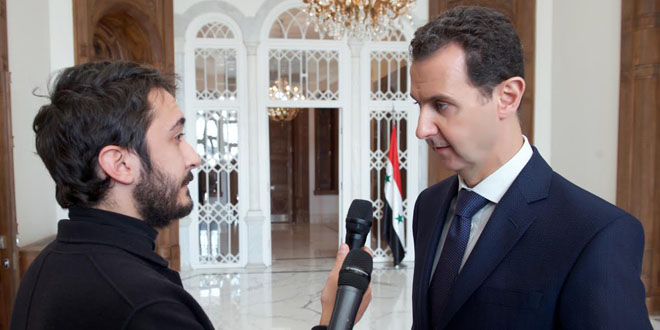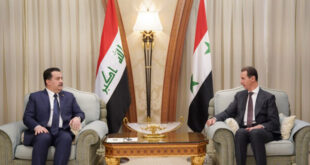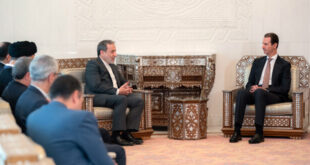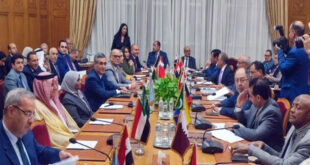Damascus, SANA – President Bashar al-Assad gave a statement to the Italian Il Giornale newspaper.
Following is the full text of the statement:
Question 1: Many Syrian people have come in Europe because of war. After the liberation of Aleppo, it seems the war is going to finish. What would you like to say to people who have run away from their home?
President Assad: If you ask me what do they want, I would tell you as a Syrian, and they are my fellow citizens, that they want to go back to their country, because everyone wants to go back to his country, but they need two things: they need stability, security, and at the same time they need the basic needs of their livelihood that many of them lost because of the war. So, in that case, I cannot say that I’m going to invite them to go back to Syria, because this is their country, they don’t need invitation to go back, but what I would like to say in that case is to the European officials who created this problem by supporting the terrorism directly or indirectly in our country, and they created this flood of Syrians going to Europe, at the same time they say “we are supporting them from a humanitarian point of view.” They don’t need your support in your country; they need your support in our country. They need to stop supporting terrorists, they need to lift the embargo that pushed many Syrians to go to Europe because of the embargo, not only because of the terrorism. Because of the embargo, they cannot live anymore in their country.
Question 2: Many political analysts think the Syrian “no” to the pipeline routes proposed by Qatar may be one of the reason why the war began in 2011. How important has been your “no” to Qatar in the beginning of the war?
President Assad: It is one of the important factors, but it wasn’t offered to us publicly, but I think it was planned; there was two routes crossing Syria: one of them is north-south, which is related to Qatar as you just mentioned, and the other one was east-west to the Mediterranean that crossed Iraq from Iran, and at that time, we were embarked in building that one that’s going east-west, and I think many countries who opposed the policy of Syria didn’t want Syria to be a hub of energy, whether electricity or oil, or even crossroads of railways, and so on. So, this is one of the factors. But the one related to the north-south and Qatar, it wasn’t proposed to us directly.
Question 3: Terrorism is a global threat. Last week, Germany has been attacked by Daesh. Is the Syrian government helping Europe to fight against terrorism? If it is, how are you doing it?
President Assad: This is simple evident to say, I can help you if you want to help yourself, but if you don’t want to help yourself, how can I help you? The problem with Europe is that they don’t want to help themselves. They are working – I mean the officials and the governments – working against their interest. They are working against the interest of their own people. They are supporting the terrorists. How can I help them if they are supporting the terrorists in our region, in order to halt terrorism attack in Europe? I cannot. If you don’t have good policy before intelligence, you cannot achieve any result, whether through the intelligence or militarily or any other way. Politics is the umbrella. So, the politics in Europe are in support of those terrorists. When they change their politics, we’re going to be ready to help them.
Question 4: The last question, Mr. Assad. Christians have suffered a lot because of the war. What kind of role may they have in helping Syria today?
President Assad: If you look at Syria, not today, not during the last few years; during the last centuries, it’s always diverse, it’s a melting pot of different religions, sects, and ethnicities. We have a wide spectrum of diversity. Without this wide spectrum of diversity, you won’t have Syria, regardless of the name, regardless of the political border; I’m talking about Syria as society, as it was before the war. Because of this war, you have many demographic changes, whether because of the displacement of the people internally or externally. My impression, and I’m confident about that, after the war the majority of the Syrians will go back to Syria. So, Syria is going to, let’s say, if you want to use the word, be reborn naturally, because it hasn’t vanished yet, this is first. Second, this war has brought many Syrians together. They learned the lessons – so many lessons – that if we don’t accept each other, if we don’t respect each other on every level of this word, you cannot have unified society. Without this unified society, Syria cannot be reborn. So, I think, not only to talk about the rebirth of Syria, I can feel today that if you don’t have terrorism, the social society is going to be much stronger than the society that you knew before the war, because of the lesson that we’ve learned.
Journalist: Thank you, Mr. Assad.
President Assad: Thank you.
 Syrian Arab News Agency S A N A
Syrian Arab News Agency S A N A




